#Based on the evidence
Text
I am BARELY resisting going full red-strings-corkboard on this season. And by barely resisting I mean not resisting at all here is an extremely long list of the events those pins would be marking out.
BigB getting a Task that was a different color than everyone else's. It's not just a randomly assigned Hard Task, bc Scar rerolled for a Hard Task and his was also just a white envelope. It's fundamentally different.
That task taking BigB away from socialization, and seemingly being an incredibly time-consuming and dull request. Of profound disinterest to any watchers.
The phrasing of his Task!!
Dig a big hole. All the way down. At least 3x3. Make it your base if you want.
Everyone else's are direct and formal - the only one with more than one sentence was Skizz's, with the rule clarification of "One attempt only." Bigb's Task is four short abrupt sentences. It is also the only Task to contain extraneous information, 'Make it your base if you want.' The requirements (at least 3x3) feel like an afterthought to mimic the numerical/specific demands of the other tasks.
Evo symbol on the face of the Secret Keeper statue.
The fact that there's a statue at all; the fact that there is a physical representation of what is assigning tasks that everyone must complete, when previously everything was always handled via commands and unseen RNG.
Grian talking to the statue, and (bc of his Actual Role as game organizer) acting as a mediator for the impartial decisions handed down, speaking for it.
Grian making one last bad joke and saying he doesn't know if it counted or not- depends on whether we the audience laughed.
Grian asking for task recommendations from the audience. The watchers are making the tasks. The Watchers are making the tasks.
Again I could be off-base, and I'm not usually even that smitten with bringing in Evo lore. I don't want a Big Bad really...but. It feels like something very unusual and intentional and cool is happening in this series. And I'd guess we'll know if theres something going on once we have more than one data point.
My largely unfounded suspicion is that there is another being (maybe Listeners, maybe something else) trying to reach out to the Players via decoy Tasks, and BigB was the first recipient. Get them alone, make them of disinterest to the watchers, and tell them something we don't get to know.
Because that's the really, really fucking cool part (if my wacky theory is remotely right): We're the bad guys. We're the ones giving out tasks - hell, we're the ones actively brainstorming harder and crueller tasks in Grian's comments!
If they actually made a story where the Players have to keep secrets from us I will be delighted. Bc that is the same genius bullshit that made Evo Watcher lore so fun
#secret life#slsmp#life series#grian#secret life smp#bigb#i think im starting to get the shape of the conceit#this could all be nonsense of course. i may be completely off base and nothing will happen and it's just a normal life series#but it feels like there's something Larger happening here#anyways. will keep thinking and mulling this over and collecting scraps of evidence#secret life spoilers#slsmp spoilers#spoilers#salem meta#salem tag#im so enriched. i love being wrong about stories
6K notes
·
View notes
Text
By the way, when I say that I really do believe that we will make it, I am 100% saying that as someone who has been following good news extensively + basically daily for over two years now, and has come to that conclusion slowly and deliberately, based on extensive available evidence. It's not a platitude. I genuinely do mean it, and I could write you a whole dissertation on all the reasons why.
(you know. if I had the time and an in-progress doctorate. rip.)
#worth emphasizing that I am NOT a scientist#but I do have years of experience working in science communication#which is weird to say tbh#partly because we also did a lot of things that weren't science (or were more indirectly science)#and partly because psychology is so often considered not a science or not a “hard science”#but technically my professional specialty literally is mental health and Evidence Based psychology#anyway#not news#me
701 notes
·
View notes
Text
If god didn't want me to sexualize That Middle Aged Man then he would have struck me down where I'm standing by now
#and based on that evidence I shall continue guilt free#not totally guilt free tho I'm totally tagging this as masked#masked#malevolent#malevolent podcast#arthur lester#arthur malevolent#malevolent arthur
457 notes
·
View notes
Text

The Wizards Favorite Apprentice
One more piece before the countdown 2 Ruin, this time featuring my favorite little dude; Gregory(fucked up edition)<3
RBs appreciated!
Also I hope you don't mind the tag but LOOK!!! THE LITTLE DUDE!!!!!!!! @astro-inthestars
#fnaf security breach#fnaf#fnaf sb#fnaf sb gregory#fnaf security breach gregory#fnaf gregory#fnaf dr rabbit#fnaf Dr.Rabbit#fnaf sb dr. rabbit#fnaf security breach dr. rabbit#Chipillustrates#my art#my silly little dude I love him very much#this is based on a bunch of theories and evidence that only like one person will understand fully (Astro Astro Azzy I'm looking at you Azzy#I popped off honestly#The neurodivergence got to me on this one#fnaf patient 46#fnaf sb patient 46#fnaf therapy tapes#okay I'm done now I need to sleep#I love my son my little guy silliest dude ever#every detail here is intentional btw I put SO much thought and detail and effort into this
1K notes
·
View notes
Text
Palantir’s NHS-stealing Big Lie
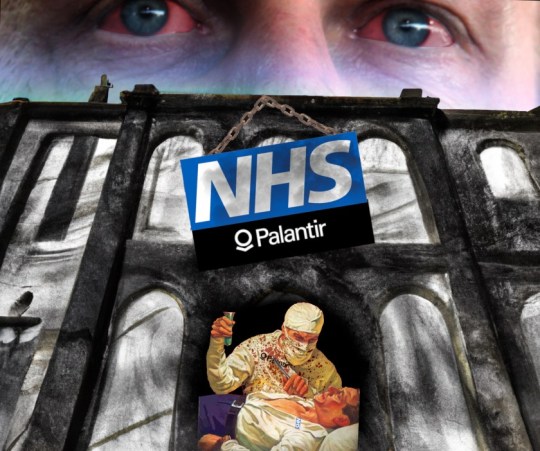
I'm on tour with my new, nationally bestselling novel The Bezzle! Catch me in TUCSON (Mar 9-10), then SAN FRANCISCO (Mar 13), Anaheim, and more!

Capitalism's Big Lie in four words: "There is no alternative." Looters use this lie for cover, insisting that they're hard-nosed grownups living in the reality of human nature, incentives, and facts (which don't care about your feelings).
The point of "there is no alternative" is to extinguish the innovative imagination. "There is no alternative" is really "stop trying to think of alternatives, dammit." But there are always alternatives, and the only reason to demand that they be excluded from consideration is that these alternatives are manifestly superior to the looter's supposed inevitability.
Right now, there's an attempt underway to loot the NHS, the UK's single most beloved institution. The NHS has been under sustained assault for decades – budget cuts, overt and stealth privatisation, etc. But one of its crown jewels has been stubbournly resistant to being auctioned off: patient data. Not that HMG hasn't repeatedly tried to flog patient data – it's just that the public won't stand for it:
https://www.theguardian.com/society/2023/nov/21/nhs-data-platform-may-be-undermined-by-lack-of-public-trust-warn-campaigners
Patients – quite reasonably – do not trust the private sector to handle their sensitive medical records.
Now, this presents a real conundrum, because NHS patient data, taken as a whole, holds untold medical insights. The UK is a large and diverse country and those records in aggregate can help researchers understand the efficacy of various medicines and other interventions. Leaving that data inert and unanalysed will cost lives: in the UK, and all over the world.
For years, the stock answer to "how do we do science on NHS records without violating patient privacy?" has been "just anonymise the data." The claim is that if you replace patient names with random numbers, you can release the data to research partners without compromising patient privacy, because no one will be able to turn those numbers back into names.
It would be great if this were true, but it isn't. In theory and in practice, it is surprisingly easy to "re-identify" individuals in anonymous data-sets. To take an obvious example: we know which two dates former PM Tony Blair was given a specific treatment for a cardiac emergency, because this happened while he was in office. We also know Blair's date of birth. Check any trove of NHS data that records a person who matches those three facts and you've found Tony Blair – and all the private data contained alongside those public facts is now in the public domain, forever.
Not everyone has Tony Blair's reidentification hooks, but everyone has data in some kind of database, and those databases are continually being breached, leaked or intentionally released. A breach from a taxi service like Addison-Lee or Uber, or from Transport for London, will reveal the journeys that immediately preceded each prescription at each clinic or hospital in an "anonymous" NHS dataset, which can then be cross-referenced to databases of home addresses and workplaces. In an eyeblink, millions of Britons' records of receiving treatment for STIs or cancer can be connected with named individuals – again, forever.
Re-identification attacks are now considered inevitable; security researchers have made a sport out of seeing how little additional information they need to re-identify individuals in anonymised data-sets. A surprising number of people in any large data-set can be re-identified based on a single characteristic in the data-set.
Given all this, anonymous NHS data releases should have been ruled out years ago. Instead, NHS records are to be handed over to the US military surveillance company Palantir, a notorious human-rights abuser and supplier to the world's most disgusting authoritarian regimes. Palantir – founded by the far-right Trump bagman Peter Thiel – takes its name from the evil wizard Sauron's all-seeing orb in Lord of the Rings ("Sauron, are we the baddies?"):
https://pluralistic.net/2022/10/01/the-palantir-will-see-you-now/#public-private-partnership
The argument for turning over Britons' most sensitive personal data to an offshore war-crimes company is "there is no alternative." The UK needs the medical insights in those NHS records, and this is the only way to get at them.
As with every instance of "there is no alternative," this turns out to be a lie. What's more, the alternative is vastly superior to this chumocratic sell-out, was Made in Britain, and is the envy of medical researchers the world 'round. That alternative is "trusted research environments." In a new article for the Good Law Project, I describe these nigh-miraculous tools for privacy-preserving, best-of-breed medical research:
https://goodlawproject.org/cory-doctorow-health-data-it-isnt-just-palantir-or-bust/
At the outset of the covid pandemic Oxford's Ben Goldacre and his colleagues set out to perform realtime analysis of the data flooding into NHS trusts up and down the country, in order to learn more about this new disease. To do so, they created Opensafely, an open-source database that was tied into each NHS trust's own patient record systems:
https://timharford.com/2022/07/how-to-save-more-lives-and-avoid-a-privacy-apocalypse/
Opensafely has its own database query language, built on SQL, but tailored to medical research. Researchers write programs in this language to extract aggregate data from each NHS trust's servers, posing medical questions of the data without ever directly touching it. These programs are published in advance on a git server, and are preflighted on synthetic NHS data on a test server. Once the program is approved, it is sent to the main Opensafely server, which then farms out parts of the query to each NHS trust, packages up the results, and publishes them to a public repository.
This is better than "the best of both worlds." This public scientific process, with peer review and disclosure built in, allows for frequent, complex analysis of NHS data without giving a single third party access to a a single patient record, ever. Opensafely was wildly successful: in just months, Opensafely collaborators published sixty blockbuster papers in Nature – science that shaped the world's response to the pandemic.
Opensafely was so successful that the Secretary of State for Health and Social Care commissioned a review of the programme with an eye to expanding it to serve as the nation's default way of conducting research on medical data:
https://www.gov.uk/government/publications/better-broader-safer-using-health-data-for-research-and-analysis/better-broader-safer-using-health-data-for-research-and-analysis
This approach is cheaper, safer, and more effective than handing hundreds of millions of pounds to Palantir and hoping they will manage the impossible: anonymising data well enough that it is never re-identified. Trusted Research Environments have been endorsed by national associations of doctors and researchers as the superior alternative to giving the NHS's data to Peter Thiel or any other sharp operator seeking a public contract.
As a lifelong privacy campaigner, I find this approach nothing short of inspiring. I would love for there to be a way for publishers and researchers to glean privacy-preserving insights from public library checkouts (such a system would prove an important counter to Amazon's proprietary god's-eye view of reading habits); or BBC podcasts or streaming video viewership.
You see, there is an alternative. We don't have to choose between science and privacy, or the public interest and private gain. There's always an alternative – if there wasn't, the other side wouldn't have to continuously repeat the lie that no alternative is possible.

Name your price for 18 of my DRM-free ebooks and support the Electronic Frontier Foundation with the Humble Cory Doctorow Bundle.

If you'd like an essay-formatted version of this post to read or share, here's a link to it on pluralistic.net, my surveillance-free, ad-free, tracker-free blog:
https://pluralistic.net/2024/03/08/the-fire-of-orodruin/#are-we-the-baddies

Image:
Gage Skidmore (modified)
https://commons.m.wikimedia.org/wiki/File:Peter_Thiel_(51876933345).jpg
CC BY-SA 2.0
https://creativecommons.org/licenses/by-sa/2.0/deed.en
#pluralistic#peter thiel#trusted research environment#opensafely#medical data#floss#privacy#reidentification#anonymization#anonymisation#nhs#ukpoli#uk#ben goldacre#goldacre report#science#evidence-based medicine#goldacre review#interoperability#transparency
520 notes
·
View notes
Text
#poll#bad history#no Baylie Carson you cannot be 'she/they Boleyn'#you are a nonbinary actor playing a cis female 'character.' because she's not a character. she's a real person#who was a cis woman#with no known evidence of liking other women. ergo based on current scholarship...she was not queer#and it's cool I think! more trans and NB actors SHOULD play cis characters! god knows the reverse happens often enough!#but. yeah.#interestingly the pocket thing was a stolen and misrepresented bit of worldbuilding from another author#who was very clear- when the debate came to her attention -that it was fictional and she made it up#(it was from Alix E. Harrow's The Once and Future Witches)#but Forster blocked everyone who pointed this out and deleted all contradicting comments
756 notes
·
View notes
Text

Have you ever wondered exactly what's going on with all the dead bodies in the Wyrm's Rock audience hall, if you leave and come back after Gortash's coronation?
I did some in-game research while working on a fic recently, and in the name of sparing anyone else from having to lay all this out, too—here's a list of the victims, and some notes-based educated guessing on Gortash's motivation here.
(Beyond Iron Counsul Nuff's summary in the screenshot above: "My lord requires a clear path to his magnificent future. We cut away the troublesome bramble.")
Lord Petric Amber
Lord Amber's Bodyguard
Lady Ailis Belt
Lady Haeril Birch
Baron Callem Bormul
Lady Alia Durinbold
Lady Durinbold's Bodyguard
Lady Durinbold's Attendant
Lord Sarken Eomane
Admiral Peil Hullhollyn
Lady Winstra Hullhollyn
Lord Raylen Jannath
Lord Jannath's Bodyguard
Duke Dillard Portyr
Lord Portyr's Attendant
Lord Portyr's Bodyguard
Lady Beatrice Provoss
Lord Myer Ravenshade
Lady Silifrey Sashenstar
Lord Rugger Shattershield
Lord Shattershield's Bodyguard
Lord Shattershield's Attendant
Lord Milton Tillerturn
Lord Randolf Vammas
Lady Madeline Whitburn
9 Unnamed Patriars
First I'll note that not everyone you see lingering after the coronation ends up dead: I could talk to Lady Eshvelt Guthmere, Lady Ruth Linnacker, and Lady Freida Oberon, and their bodies aren't present in the hall later.
It also doesn't seem to be connected to vocalizing support for Gortash or not—you can overhear Portyr and Shattershield challenging him in the ambient dialogue after the coronation, but when you walk around and talk to everyone else the only one who has anything negative to say is Silifrey Sashenstar. Everyone else on the list above sings Gortash's praises.
So, here's what I think it is!
In the corner of the audience hall, you can find this note:
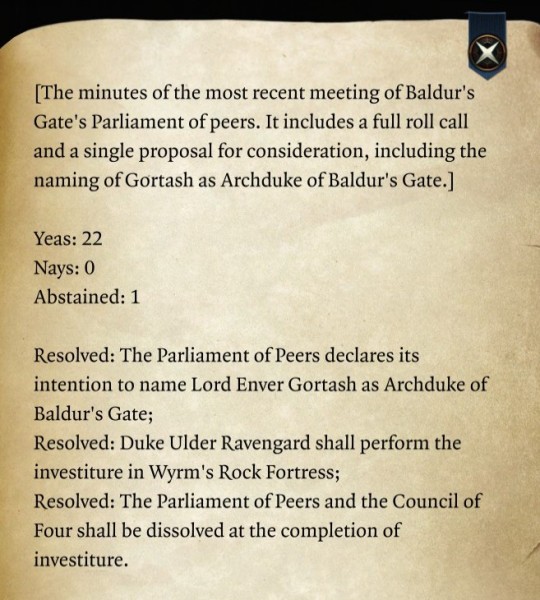
The Parliament of Peers is the body that's responsible for electing new dukes, and they held a formal vote to raise Gortash as Archduke and dissolve their own political body. Note the numbers: there's 23 members.
So who are these members? Up in Gortash's study, you can find this note discussing bribing, blackmailing, and threatening members of the Peers, which gives us the names of eight:
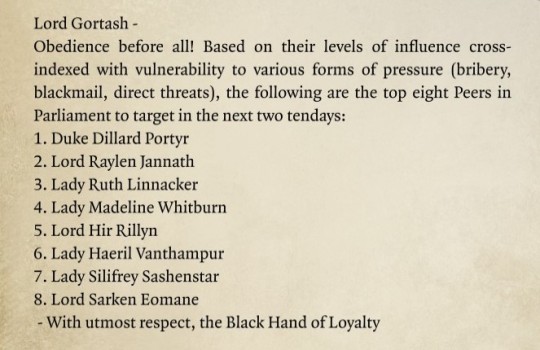
Five of these eight end up dead in the audience hall (Portyr, Jannath, Whitburn, Sashenstar, and Eomane).
As for the three Peers listed who don't end up in dead in the hall—Lady Ruth Linnacker, Lord Hir Rillyn, and Lady Haeril Vanthampur—let's look to this note:
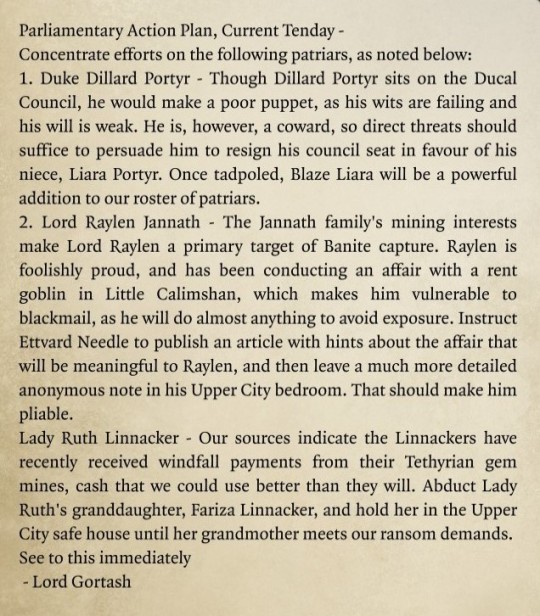
Gortash has leverage against Ruth Linnacker through the abduction of her granddaughter, and I don't think it's unfair to assume Hir Rillyn and Haeril Vanthampur are similarly under Gortash's control, whether tadpoled or blackmailed (this is the one big assumption I had to make—bear with me!).
The other two with non-murderous leverage against them in the note above do end up dead, but I think there's some added context: I imagine Raylen Jannath is the husband of Wisteria Jannath, who Gortash canonically had an affair with (maybe it's personal? Maybe Raylen didn't care enough about the leverage of his own affair, if he knew she'd had one too?). For Portyr, there's the following in Gortash's study, noting he considers him a threat that shouldn't be underestimated, so he may not have wanted to stop at threats:
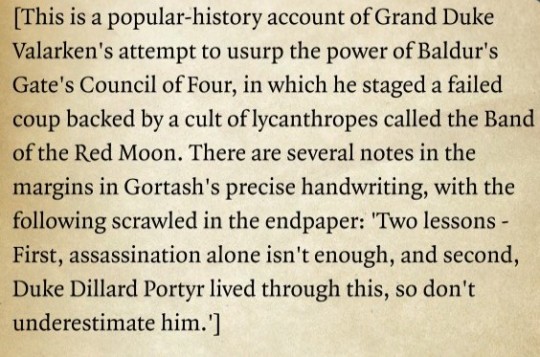
The inclusion of Portyr on the list of eight Peers could imply that the other three dukes are members of the Parliament of Peers, too. There's a book in Franc Peartree's house about the current state of who the dukes are, which I don't have my own screenshot of, but here's the relevant text from the wiki:
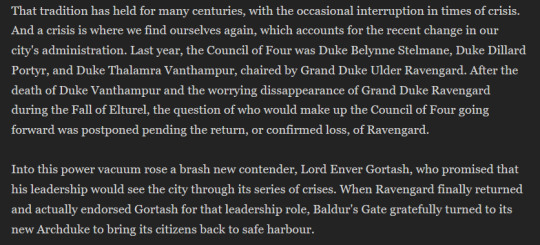
We know Belynne Stelmane is dead as part of the Bhaalist plot. Ulder Ravengard is tadpoled. The fourth duke was Thalamra Vanthampur, who's dead. They were waiting to replace her until Ravengard was found or confirmed gone—and Gortash was given this seat.
So, back to the original list of people murdered after the coronation. I bolded the names of those who aren't seemingly collateral damage (the bodyguards and attendants, and the unnamed patriars): there's 17.
17 killed after the coronation
Plus three Peers controlled through blackmail or other means
Plus Duke Stelmane and Duke Ravengard, dead and tadpoled respectively
That adds up to 22.
Add in Gortash's own vote, which he would have from taking (Thalamra) Vanthampur's seat, and you get 23.
The same number as the members of the Parliament of Peers.
Gortash didn't just orchestrate the Peers naming him the city's first Archduke, and he didn't just influence them to dissolve the political body that could vote another duke in. He made sure the individuals were destroyed, too.
#bg3#baldur's gate 3#enver gortash#gortash#bg3 meta#bg3 spoilers#anyway this took up way too much of my life so I hope my Gortash Math can be useful to someone else#also side note: I know some other sources like Murder in Baldur's Gate claim there's closer to 50 Peers#but going based on in-game evidence here
574 notes
·
View notes
Text
TOP MOST BREEDABLE TRANSFORMERS CHARACTERS
None, these are robots, they can't get pregnant
RODIMUS "THAT SLUT" PRIME
#3. prowl bc i WILL get that robot pregnant#4. rachet evidently. based on what ive seen from this fandom#cookie talks#valveplug
314 notes
·
View notes
Text

#this is based off scientific evidence btw#frederick chilton#will graham#hannibal lecter#hannibal#nbc hannibal#willgrahamsbecoming#hannigram
839 notes
·
View notes
Text

@crumb-crumblet-s-crumbington
AT LEAST once a week
#srry for the tag I couldn’t reply with a video idk why </3#I feel evidence was needed#karl heisenberg#lady dimitrescu#maggie robertson#neil newbon#resident evil#resident evil 8#re8#Ethan winters#<based off mention
373 notes
·
View notes
Text



a smorgasboard of frequency-based art that i either never posted or finished
#my art#frequency fic#too many thads au#thad thawne#thaddeus thawne#inertia#based on quantity i think six is probably my favorite to draw#i cannot deny the evidence smh
262 notes
·
View notes
Text

Love's the Only Medicine [Honkai: Star Rail]
Fandom: Honkai: Star Rail
Characters: Dr. Ratio
Notes: SO. First off, those of you waiting on Lyney fic, it is postponed for now because I'm stuck :( but for now I'm working on a Dr. Ratio fic and I'm having a little trouble so these are my headcanons for how a good/healthy relationship with him would actually work because I love to write fluff all the time <3

So, how does one go about romancing the Dr. Veritas Ratio?
∘∙⊱⋅•⋅Have independence. Dr. Ratio is a busy man, and while he'd of course value your relationship (why else would he be in a relationship in the first place?), he wouldn't fare well with someone who is the clingy type. A relationship that would work best for him is one where you share in each other's missions, victories, and defeats as best as you can without melding your lives into one singular identity. With the exception of certain instances where you worked with him prior to the relationship starting/getting serious (though even then, he might drop the idea of separating your work paths a little bit to ensure there is no space for rational, scientific endeavors to be tangled with personal emotions), Dr. Ratio is perfectly content to with a relationship where some aspects of your lives don't always cross. Of course he wants to spend time with you! He just appreciates his own ability to act independently and keep work and personal matters separate. (Plus I feel like he'd find independence kinda attractive anyway :P)
∘∙⊱⋅•⋅Keep him grounded. Dr. Ratio gets lost in his thoughts frequently. He understands that facts and calculations can only go so far in the real world (though they could go MUCH FURTHER in his opinion, hence his cosmic mission to eradicate foolishness) but he loves finding the rational, mathematical answer to things. It'll be up to you to navigate a little bit more expertly on this plane. If he's trying to piece together a solution to a planet's hunger crisis, well, maybe let him sort through his lofty thoughts then. But if he's simply ignoring the world and thinking for the sake of it, you'll be able to get away with poking him out of the stupor and getting him to actually communicate with the world around him.
∘∙⊱⋅•⋅Be the people person, but don't apologize for him. Veritas has a tendency to rub people the wrong way. He's rude, abrasive, and arrogant. When others say such things without realizing you're nearby, you AGREE with them. But these are all things he knows, too. In most cases, how the reception of information makes somebody feel doesn't particularly concern him. But sometimes, especially now that he's actively placing himself in the social situation of being in a relationship, talking with people in a constructive way is necessary. He's fine with defaulting to you in these instances if it makes you feel useful. However, it is simply a matter of leaving a task to the one who knows better. If you start apologizing for his silence or a prior brash attitude, though, then he gets a little prickly. He stands by his behavior! Don't make him out to be someone you should have to apologize for or ashamed of.
∘∙⊱⋅•⋅Have clear communication skills. Listen. Veritas is an eloquent speaker, and he says exactly what he means to. However...good communication is more than just saying words that mean exactly what you want them to. You have to present information in a way that others can receive, and that's where he falls flat. The onus will fall to you to exemplify that sort of skill. Now, you don't have to teach him step-by-step how to talk nicely, but being able to do so yourself and give him a gentle nudge when it really matters will go a long way in ensuring you're talking to each other and not at each other.
∘∙⊱⋅•⋅Argue with him. Like, not actually. Argue with him academically. Veritas has stated that he feels incorrect on a matter if people agree with him. So don't agree with him! Don't spark debate just for the sake of it, but you shouldn't be afraid to voice your opinion when it goes against his. Dissent is the forebear of accuracy, after all. He won't be gentle with his arguments, but he never means to condescending when you're sharing your scholarly ideas. (Plus, this will help you get accustomed to when he is actually trying to argue you in a less casual context)
∘∙⊱⋅•⋅His love language? Quality time. Wanted all across the galaxy to solve this crisis or that, Dr. Ratio is a busy, busy man. So when you come in at the top of his list of priorities, that's how you know he's in deep. If you receive a certain love language particularly well, he can adapt! But his default is both to give and receive quality time. Even just time together that isn't attentive and specifically for each other can mean a lot to him. If you're both busy with work, he can be placated by attending to your duties but staying in the same room as each other. Don't worry about distracting him, either - as of late, he finds himself distracted when you aren't around, and at ease when you are.
∘∙⊱⋅•⋅Have a hunger for knowledge. It can be intimidating to hear him denounce all fools of the universe when he doesn't give many specific answers as to what a fool is. Veritas doesn't care about a lack of knowledge; what he cares about is a lack of awareness and a lack of trying. He'd be a fool himself if he pretended as though everyone had the same access to the same level of education, or that there weren't people who gravitated towards certain skills. After all, he's widely regarded as a genius, but you don't exactly see him releasing academic journals on any musical studies, do you? (Now, could he write one? Probably. But that's not the point.) As tough of a teacher as he is, what he's after is undying tenacity; that you never falter in the face of obstacles, and that you never place your scholarship on a shelf so high it winds up collecting dust, unused. If you don't know something, that's fine - go figure it out! Don't just say 'I don't know' and leave the matter at that. Learning through experience is an incredibly strong way of gathering knowledge. Just...don't expect him to be any nicer about your lack of prior knowledge just because you are close to him or you are trying to remedy that. At the end of the day, you did fall in love with a guy who's just kind of an ass sometimes :/
∘∙⊱⋅•⋅Be honest. This is one that could go for anybody in any relationship, but it is a top priority for Dr. Ratio. He's based his entire life on searching and spreading absolute truth in every corner of the cosmos. Normally, this takes the form of objective, empirically provable fact. But he finds it frustrating if you won't be honest about your feelings or what you want, how is he to know what to do? You'll have him acting like a fool with your refusal to face your own truth! (This is, of course, a roundabout way of saying that he doesn't have it in him to be playing games. Be straightforward with him, please. It'll be much easier for the both of you that way.)
∘∙⊱⋅•⋅Don't be afraid to get a little poetic on him. Veritas is a scientific man. He understands artistic endeavors, of course, but that isn't how his brain is wired. He operates in verifiable conclusions and building hypotheses, not the more abstract patterns of intuition or leading by the heart. He can analyze and understand such things, but if you want him to be able to appreciate the aesthetic beauty of the world, you will probably have to lead by example. You won't change his way of thinking, but maybe if you see a rare bird one day, he'll appreciate the opportunity to see something so rare and beautiful instead of analyzing how far it has deviated from its normal breeding grounds.
∘∙⊱⋅•⋅Flirting is a game, but love isn't. Don't be so dull with him! Dr. Ratio would love an opportunity to subtly ash his wits about yours in a little flirtatious back-and-forth. Both in the early stages and a more established relationship, Dr. Ratio loves a good challenge and could spend all night just trying to out-flirt the other. Regardless of whether or not you're one to get flustered, he loves your reactions anyway. Sheepishness, frustration, no emotion whatsoever - whatever you feel,, he finds how you try to school your expressions into complete apathy amusing. He is hard to fluster himself, but if he continues the same line of teasing in the morning the next day, you can assume he's been thinking about you all night. However! Dr. Ratio often expects people, especially those precious few who he respects, to operate on his level. If he's truly buckling down for the long game, he'll make sure to make his feelings clear. Flirtation is always on the table, but "playing hard to get" or trying to "keep him guessing" as you near a truly established relationship is a turn off. Flirt for fun, not to manipulate his interest in you. Believe him, he would've left by now if he wanted to.
∘∙⊱⋅•⋅Look beyond his scientific approach to matters of the heart. In loving anybody, you'll have to learn how to read between certain lines. Even if you are a pure-blooded emotionally charged person, Veritas can only meet you halfway on the road to compromise. Take the time to study how he speaks and what he means- concise as he is, speaking so straightforwardly all the time often has an opposite affect on his words when he's trying to be romantic. Learn the ways he looks after you and tries to make your life easier without asking; notice how he spends a large portion of his available time with you, even if it means dragging you along to discussing things with people who he feels are completely beneath his IQ; realize that his tone may always be steadfast and dominating, but he never speaks out to shut you down or demean you the way he does to others. If you can translate all the little ways he uses to show you how much he values you, then you may just find yourself in a relationship far more enriching than you'd expect.

#honkai star rail#hsr#hsr x reader#hsr dr ratio#dr ratio#dr ratio x reader#☆ star rail#☆ dr ratio#🐚 capricorn ゚+..。*゚+{hcs}#🌠 pisces ゚+..。*゚+{all writing}#a note that didn't make the cut: HUMBLE HIM#i was going through some of his lines in the stars of ingenuity quest and#boy what is your PROBLEM#antagonizing the trailblazer just because you're a suspicious little freak#decided their vibes were bad based on nothing but ANECDOTAL EVIDENCE#i'm so serious. what is your deal. i'll kiss it out of you boy don't think i wont
205 notes
·
View notes
Text
i think mostly we as a culture need to stop pretending media is for us and instead recognize that it's for the people making it. "the show didn't do the thing I wanted it to" is so not the point. did it do what the people making it wanted it to do? did it tell the story they were trying to tell? than it was successful. if that doesn't align with what you wanted to happen, don't get up in arms about it. don't badmouth the creators and throw a tantrum. that's what fan works are for. the text is the text, and it told the story it was telling. you wouldn't be like "ugh shakespeare is insane for act v btw like there was no reason for juliet to kill herself she should've just waited and then her and romeo could have been together wtf this ruined the whole play" like no!!! the themes were there the set-up was there the foreshadowing was there shakespeare did what he intended to. just because it wasn't a happy ending and just because you thought it should've went differently doesn't mean it was bad. read a fic where juliet lives and move on.
#this is about ghosts but honestly fandom in general#stop pretending the creators of things owe you certain story lines. they're making it not you#i explained it like this to my sister:#imagine you're reading a book and there are sort of hints and scenes that you take to interpret a character as gay#you cite quotes and talk about the themes and the impact of your interpretation#and then at the end of the book the character comes out as asexual.#and then a lot of those scenes and quotes that you were using as evidence for your interpretation-#now they could be construed to have been pointing towards them being ace all along#just because it wasnt the end you fabricated in your head based on your understanding of the hints#doesn't mean it wasnt always the writers plan from the beginning.#AND it doesnt mean you can't keep imagining a world where they're gay instead#it just means that the writer was leaving those clues to point you towards the ending#and you interpreted the clues differently#bbc ghosts#ghosts spoilers#bc like. if last resort was the ending#you could 'read' the whole series with the understanding that they weren't going to leave the house#and the foreshadowing would add up#but now with the special. you can go back and 'read' the series with the understanding that they leave#and it still all adds up. the foreshadowing was there it just meant something different than you thought.#stories have beginnings middles and ends#you predetermined the ending while still in the middle and got mad when you weren't right.#does that make sense?
329 notes
·
View notes
Text
Eddie mumbles something about how he's always wanted to try it and kisses Steve in the Upside Down because he figures he's gonna be dead in a minute, so its whatever. Tragically rolls a 1 on that plan. Crit fails his plan so hard that he ends up surviving what the doctors kept insisting should have been fatal blood loss.
Eventually, despite his requests to the nurses and to Wayne that he not have to see Steve, the guy manages to get through, late at night when the others were at home in bed.
Steve looks serious, forehead creasing, and awkward as hell. Uncomfortable. Eddie isn't an idiot, so he spotted Robin years ago. As close as those two are, Eddie knows that Steve must know about her, and must be cool with it. But its different when its not a lack of attraction, but an unwanted one.
Steve asks, tensely, with careful words, why Eddie kissed him, and what he meant when he said he always wanted to try it.
Eddie doesn't lie.
'I didn't want to die without ever kissing someone.'
'And... I was the only one around who wasn't 14.'
Steve exhales and his shoulders relax, and the only thing Eddie can label that as is relief. He doesn't ask any more questions, and he leaves Eddie alone for the most part, even after Eddie leaves the hospital. Whenever they're in the same place though - parties, hangouts, the kids - Eddie can feel him looking. He never catches him. Steve reacts too fast, but Eddie knows he's watching him. He tries, he forces himself to keep his comments fiercely platonic. Perfectly heterosexual. He's successful.
So is Steve. Eddie doesn't catch him staring, so Eddie never sees how Steve looks at him.
#steddie ficlet#idek man#I'm so tired#and was rereading Hold me now i need relief#and love soft misunderstandings#ones born of two people being afraid#and making totally reasonable assumptions based on the evidence they have
181 notes
·
View notes
Note
my god the papyrus introvert/extrovert analysis was so pussy popping for me. can I ask how you analyze characters because at this point you have to leave some prowess for the rest of us. love your stuff.
rule number one never state anything as fact unless you can back it up with minimum one direct reference to canon, preferably more. Unfortunately you just have to be really autistic for this step (tip: the undertale dialogue dump and the UT text project are your best friends)
rule number two, be your own most insidious critic. look over what you put together and think "if i were a contrarian little shit who wanted to disagree with everything i said, what would be my arguments, what sources would i cite, what ground would i stand on" and either pick their thesis to shreds, or alter your original take accordingly if you do notice a gap in your logic.
rule number three, always, always ask yourself "why would toby have made this decision". characters and stories don't appear out of the ether, they are information offered to you by the author with (sometimes very clear, sometimes not so much) intent behind it. if the text presents you with something, ask yourself: should i take this at face value? is this an objective representation of reality within the work? is this tainted by one of the characters' personal views? are they right? are they wrong? are they lying? are they misinformed? repeat the first two thesis/antithesis/synthesis steps for this stuff as well and you'll slowly build up your analysis muscles
#answered asks#undertale#also confront yourself with other people's analysis and see how you would approach it#do you agree do you disagree why. is your reaction based on evidence or purely gut instinct. is your gut instinct accurate#etc etc
150 notes
·
View notes
Text
In defense of bureaucratic competence

Sure, sometimes it really does make sense to do your own research. There's times when you really do need to take personal responsibility for the way things are going. But there's limits. We live in a highly technical world, in which hundreds of esoteric, potentially lethal factors impinge on your life every day.
You can't "do your own research" to figure out whether all that stuff is safe and sound. Sure, you might be able to figure out whether a contractor's assurances about a new steel joist for your ceiling are credible, but after you do that, are you also going to independently audit the software in your car's antilock brakes?
How about the nutritional claims on your food and the sanitary conditions in the industrial kitchen it came out of? If those turn out to be inadequate, are you going to be able to validate the medical advice you get in the ER when you show up at 3AM with cholera? While you're trying to figure out the #HIPAAWaiver they stuck in your hand on the way in?
40 years ago, Ronald Reagan declared war on "the administrative state," and "government bureaucrats" have been the favored bogeyman of the American right ever since. Even if Steve Bannon hasn't managed to get you to froth about the "Deep State," there's a good chance that you've griped about red tape from time to time.
Not without reason, mind you. The fact that the government can make good rules doesn't mean it will. When we redid our kitchen this year, the city inspector added a bunch of arbitrary electrical outlets to the contractor's plans in places where neither we, nor any future owner, will every need them.
But the answer to bad regulation isn't no regulation. During the same kitchen reno, our contractor discovered that at some earlier time, someone had installed our kitchen windows without the accompanying vapor-barriers. In the decades since, the entire structure of our kitchen walls had rotted out. Not only was the entire front of our house one good earthquake away from collapsing – there were two half rotted verticals supporting the whole thing – but replacing the rotted walls added more than $10k to the project.
In other words, the problem isn't too much regulation, it's the wrong regulation. I want our city inspectors to make sure that contractors install vapor barriers, but to not demand superfluous electrical outlets.
Which raises the question: where do regulations come from? How do we get them right?
Regulation is, first and foremost, a truth-seeking exercise. There will never be one obvious answer to any sufficiently technical question. "Should this window have a vapor barrier?" is actually a complex question, needing to account for different window designs, different kinds of barriers, etc.
To make a regulation, regulators ask experts to weigh in. At the federal level, expert agencies like the DoT or the FCC or HHS will hold a "Notice of Inquiry," which is a way to say, "Hey, should we do something about this? If so, what should we do?"
Anyone can weigh in on these: independent technical experts, academics, large companies, lobbyists, industry associations, members of the public, hobbyist groups, and swivel-eyed loons. This produces a record from which the regulator crafts a draft regulation, which is published in something called a "Notice of Proposed Rulemaking."
The NPRM process looks a lot like the NOI process: the regulator publishes the rule, the public weighs in for a couple of rounds of comments, and the regulator then makes the rule (this is the federal process; state regulation and local ordinances vary, but they follow a similar template of collecting info, making a proposal, collecting feedback and finalizing the proposal).
These truth-seeking exercises need good input. Even very competent regulators won't know everything, and even the strongest theoretical foundation needs some evidence from the field. It's one thing to say, "Here's how your antilock braking software should work," but you also need to hear from mechanics who service cars, manufacturers, infosec specialists and drivers.
These people will disagree with each other, for good reasons and for bad ones. Some will be sincere but wrong. Some will want to make sure that their products or services are required – or that their competitors' products and services are prohibited.
It's the regulator's job to sort through these claims. But they don't have to go it alone: in an ideal world, the wrong people will be corrected by other parties in the docket, who will back up their claims with evidence.
So when the FCC proposes a Net Neutrality rule, the monopoly telcos and cable operators will pile in and insist that this is technically impossible, that there is no way to operate a functional ISP if the network management can't discriminate against traffic that is less profitable to the carrier. Now, this unity of perspective might reflect a bedrock truth ("Net Neutrality can't work") or a monopolists' convenient lie ("Net Neutrality is less profitable for us").
In a competitive market, there'd be lots of counterclaims with evidence from rivals: "Of course Net Neutrality is feasible, and here are our server logs to prove it!" But in a monopolized markets, those counterclaims come from micro-scale ISPs, or academics, or activists, or subscribers. These counterclaims are easy to dismiss ("what do you know about supporting 100 million users?"). That's doubly true when the regulator is motivated to give the monopolists what they want – either because they are hoping for a job in the industry after they quit government service, or because they came out of industry and plan to go back to it.
To make things worse, when an industry is heavily concentrated, it's easy for members of the ruling cartel – and their backers in government – to claim that the only people who truly understand the industry are its top insiders. Seen in that light, putting an industry veteran in charge of the industry's regulator isn't corrupt – it's sensible.
All of this leads to regulatory capture – when a regulator starts defending an industry from the public interest, instead of defending the public from the industry. The term "regulatory capture" has a checkered history. It comes out of a bizarre, far-right Chicago School ideology called "Public Choice Theory," whose goal is to eliminate regulation, not fix it.
In Public Choice Theory, the biggest companies in an industry have the strongest interest in capturing the regulator, and they will work harder – and have more resources – than anyone else, be they members of the public, workers, or smaller rivals. This inevitably leads to capture, where the state becomes an arm of the dominant companies, wielded by them to prevent competition:
https://pluralistic.net/2022/06/05/regulatory-capture/
This is regulatory nihilism. It supposes that the only reason you weren't killed by your dinner, or your antilock brakes, or your collapsing roof, is that you just got lucky – and not because we have actual, good, sound regulations that use evidence to protect us from the endless lethal risks we face. These nihilists suppose that making good regulation is either a myth – like ancient Egyptian sorcery – or a lost art – like the secret to embalming Pharaohs.
But it's clearly possible to make good regulations – especially if you don't allow companies to form monopolies or cartels. What's more, failing to make public regulations isn't the same as getting rid of regulation. In the absence of public regulation, we get private regulation, run by companies themselves.
Think of Amazon. For decades, the DoJ and FTC sat idly by while Amazon assembled and fortified its monopoly. Today, Amazon is the de facto e-commerce regulator. The company charges its independent sellers 45-51% in junk fees to sell on the platform, including $31b/year in "advertising" to determine who gets top billing in your searches. Vendors raise their Amazon prices in order to stay profitable in the face of these massive fees, and if they don't raise their prices at every other store and site, Amazon downranks them to oblivion, putting them out of business.
This is the crux of the FTC's case against Amazon: that they are picking winners and setting prices across the entire economy, including at every other retailer:
https://pluralistic.net/2023/04/25/greedflation/#commissar-bezos
The same is true for Google/Facebook, who decide which news and views you encounter; for Apple/Google, who decide which apps you can use, and so on. The choice is never "government regulation" or "no regulation" – it's always "government regulation" or "corporate regulation." You either live by rules made in public by democratically accountable bureaucrats, or rules made in private by shareholder-accountable executives.
You just can't solve this by "voting with your wallet." Think about the problem of robocalls. Nobody likes these spam calls, and worse, they're a vector for all kinds of fraud. Robocalls are mostly a problem with federation. The phone system is a network-of-networks, and your carrier is interconnected with carriers all over the world, sometimes through intermediaries that make it hard to know which network a call originates on.
Some of these carriers are spam-friendly. They make money by selling access to spammers and scammers. Others don't like spam, but they have lax or inadequate security measures to prevent robocalls. Others will simply be targets of opportunity: so large and well-resourced that they are irresistible to bad actors, who continuously probe their defenses and exploit overlooked flaws, which are quickly patched.
To stem the robocall tide, your phone company will have to block calls from bad actors, put sloppy or lazy carriers on notice to shape up or face blocks, and also tell the difference between good companies and bad ones.
There's no way you can figure this out on your own. How can you know whether your carrier is doing a good job at this? And even if your carrier wants to do this, only the largest, most powerful companies can manage it. Rogue carriers won't give a damn if some tiny micro-phone-company threatens them with a block if they don't shape up.
This is something that a large, powerful government agency is best suited to addressing. And thankfully, we have such an agency. Two years ago, the FCC demanded that phone companies submit plans for "robocall mitigation." Now, it's taking action:
https://arstechnica.com/tech-policy/2023/10/telcos-filed-blank-robocall-plans-with-fcc-and-got-away-with-it-for-2-years/
Specifically, the FCC has identified carriers – in the US and abroad – with deficient plans. Some of these plans are very deficient. National Cloud Communications of Texas sent the FCC a Windows Printer Test Page. Evernex (Pakistan) sent the FCC its "taxpayer profile inquiry" from a Pakistani state website. Viettel (Vietnam) sent in a slide presentation entitled "Making Smart Cities Vision a Reality." Canada's Humbolt VoIP sent an "indiscernible object." DomainerSuite submitted a blank sheet of paper scrawled with the word "NOTHING."
The FCC has now notified these carriers – and others with less egregious but still deficient submissions – that they have 14 days to fix this or they'll be cut off from the US telephone network.
This is a problem you don't fix with your wallet, but with your ballot. Effective, public-interest-motivated FCC regulators are a political choice. Trump appointed the cartoonishly evil Ajit Pai to run the FCC, and he oversaw a program of neglect and malice. Pai – a former Verizon lawyer – dismantled Net Neutrality after receiving millions of obviously fraudulent comments from stolen identities, lying about it, and then obstructing the NY Attorney General's investigation into the matter:
https://pluralistic.net/2021/08/31/and-drown-it/#starve-the-beast
The Biden administration has a much better FCC – though not as good as it could be, thanks to Biden hanging Gigi Sohn out to dry in the face of a homophobic smear campaign that ultimately led one of the best qualified nominees for FCC commissioner to walk away from the process:
https://pluralistic.net/2022/12/15/useful-idiotsuseful-idiots/#unrequited-love
Notwithstanding the tragic loss of Sohn's leadership in this vital agency, Biden's FCC – and its action on robocalls – illustrates the value of elections won with ballots, not wallets.
Self-regulation without state regulation inevitably devolves into farce. We're a quarter of a century into the commercial internet and the US still doesn't have a modern federal privacy law. The closest we've come is a disclosure rule, where companies can make up any policy they want, provided they describe it to you.
It doesn't take a genius to figure out how to cheat on this regulation. It's so simple, even a Meta lawyer can figure it out – which is why the Meta Quest VR headset has a privacy policy isn't merely awful, but long.
It will take you five hours to read the whole document and discover how badly you're being screwed. Go ahead, "do your own research":
https://foundation.mozilla.org/en/privacynotincluded/articles/annual-creep-o-meter/
The answer to bad regulation is good regulation, and the answer to incompetent regulators is competent ones. As Michael Lewis's Fifth Risk (published after Trump filled the administrative agencies with bootlickers, sociopaths and crooks) documented, these jobs demand competence:
https://memex.craphound.com/2018/11/27/the-fifth-risk-michael-lewis-explains-how-the-deep-state-is-just-nerds-versus-grifters/
For example, Lewis describes how a Washington State nuclear waste facility created as part of the Manhattan Project endangers the Columbia River, the source of 8 million Americans' drinking water. The nuclear waste cleanup is projected to take 100 years and cost 100 billion dollars. With stakes that high, we need competent bureaucrats overseeing the job.
The hacky conservative jokes comparing every government agency to the DMV are not descriptive so much as prescriptive. By slashing funding, imposing miserable working conditions, and demonizing the people who show up for work anyway, neoliberals have chased away many good people, and hamstrung those who stayed.
One of the most inspiring parts of the Biden administration is the large number of extremely competent, extremely principled agency personnel he appointed, and the speed and competence they've brought to their roles, to the great benefit of the American public:
https://pluralistic.net/2022/10/18/administrative-competence/#i-know-stuff
But leaders can only do so much – they also need staff. 40 years of attacks on US state capacity has left the administrative state in tatters, stretched paper-thin. In an excellent article, Noah Smith describes how a starveling American bureaucracy costs the American public a fortune:
https://www.noahpinion.blog/p/america-needs-a-bigger-better-bureaucracy
Even stripped of people and expertise, the US government still needs to get stuff done, so it outsources to nonprofits and consultancies. These are the source of much of the expense and delay in public projects. Take NYC's Second Avenue subway, a notoriously overbudget and late subway extension – "the most expensive mile of subway ever built." Consultants amounted to 20% of its costs, double what France or Italy would have spent. The MTA used to employ 1,600 project managers. Now it has 124 of them, overseeing $20b worth of projects. They hand that money to consultants, and even if they have the expertise to oversee the consultants' spending, they are stretched too thin to do a good job of it:
https://slate.com/business/2023/02/subway-costs-us-europe-public-transit-funds.html
When a public agency lacks competence, it ends up costing the public more. States with highly expert Departments of Transport order better projects, which need fewer changes, which adds up to massive costs savings and superior roads:
https://papers.ssrn.com/sol3/papers.cfm?abstract_id=4522676
Other gaps in US regulation are plugged by nonprofits and citizen groups. Environmental rules like NEPA rely on the public to identify and object to environmental risks in public projects, from solar plants to new apartment complexes. NEPA and its state equivalents empower private actors to sue developers to block projects, even if they satisfy all environmental regulations, leading to years of expensive delay.
The answer to this isn't to dismantle environmental regulations – it's to create a robust expert bureaucracy that can enforce them instead of relying on NIMBYs. This is called "ministerial approval" – when skilled government workers oversee environmental compliance. Predictably, NIMBYs hate ministerial approval.
Which is not to say that there aren't problems with trusting public enforcers to ensure that big companies are following the law. Regulatory capture is real, and the more concentrated an industry is, the greater the risk of capture. We are living in a moment of shocking market concentration, thanks to 40 years of under-regulation:
https://www.openmarketsinstitute.org/learn/monopoly-by-the-numbers
Remember that five-hour privacy policy for a Meta VR headset? One answer to these eye-glazing garbage novellas presented as "privacy policies" is to simply ban certain privacy-invading activities. That way, you can skip the policy, knowing that clicking "I agree" won't expose you to undue risk.
This is the approach that Bennett Cyphers and I argue for in our EFF white-paper, "Privacy Without Monopoly":
https://www.eff.org/wp/interoperability-and-privacy
After all, even the companies that claim to be good for privacy aren't actually very good for privacy. Apple blocked Facebook from spying on iPhone owners, then sneakily turned on their own mass surveillance system, and lied about it:
https://pluralistic.net/2022/11/14/luxury-surveillance/#liar-liar
But as the European experiment with the GDPR has shown, public administrators can't be trusted to have the final word on privacy, because of regulatory capture. Big Tech companies like Google, Apple and Facebook pretend to be headquartered in corporate crime havens like Ireland and Luxembourg, where the regulators decline to enforce the law:
https://pluralistic.net/2023/05/15/finnegans-snooze/#dirty-old-town
It's only because of the GPDR has a private right of action – the right of individuals to sue to enforce their rights – that we're finally seeing the beginning of the end of commercial surveillance in Europe:
https://www.eff.org/deeplinks/2022/07/americans-deserve-more-current-american-data-privacy-protection-act
It's true that NIMBYs can abuse private rights of action, bringing bad faith cases to slow or halt good projects. But just as the answer to bad regulations is good ones, so too is the answer to bad private rights of action good ones. SLAPP laws have shown us how to balance vexatious litigation with the public interest:
https://www.rcfp.org/resources/anti-slapp-laws/
We must get over our reflexive cynicism towards public administration. In my book The Internet Con, I lay out a set of public policy proposals for dismantling Big Tech and putting users back in charge of their digital lives:
https://www.versobooks.com/products/3035-the-internet-con
The most common objection I've heard since publishing the book is, "Sure, Big Tech has enshittified everything great about the internet, but how can we trust the government to fix it?"
We've been conditioned to think that lawmakers are too old, too calcified and too corrupt, to grasp the technical nuances required to regulate the internet. But just because Congress isn't made up of computer scientists, it doesn't mean that they can't pass good laws relating to computers. Congress isn't full of microbiologists, but we still manage to have safe drinking water (most of the time).
You can't just "do the research" or "vote with your wallet" to fix the internet. Bad laws – like the DMCA, which bans most kinds of reverse engineering – can land you in prison just for reconfiguring your own devices to serve you, rather than the shareholders of the companies that made them. You can't fix that yourself – you need a responsive, good, expert, capable government to fix it.
We can have that kind of government. It'll take some doing, because these questions are intrinsically hard to get right even without monopolies trying to capture their regulators. Even a president as flawed as Biden can be pushed into nominating good administrative personnel and taking decisive, progressive action:
https://doctorow.medium.com/joe-biden-is-headed-to-a-uaw-picket-line-in-detroit-f80bd0b372ab?sk=f3abdfd3f26d2f615ad9d2f1839bcc07
Biden may not be doing enough to suit your taste. I'm certainly furious with aspects of his presidency. The point isn't to lionize Biden – it's to point out that even very flawed leaders can be pushed into producing benefit for the American people. Think of how much more we can get if we don't give up on politics but instead demand even better leaders.
My next novel is The Lost Cause, coming out on November 14. It's about a generation of people who've grown up under good government – a historically unprecedented presidency that has passed the laws and made the policies we'll need to save our species and planet from the climate emergency:
https://us.macmillan.com/books/9781250865939/the-lost-cause
The action opens after the pendulum has swung back, with a new far-right presidency and an insurgency led by white nationalist militias and their offshore backers – seagoing anarcho-capitalist billionaires.
In the book, these forces figure out how to turn good regulations against the people they were meant to help. They file hundreds of simultaneous environmental challenges to refugee housing projects across the country, blocking the infill building that is providing homes for the people whose homes have been burned up in wildfires, washed away in floods, or rendered uninhabitable by drought.
I don't want to spoil the book here, but it shows how the protagonists pursue a multipronged defense, mixing direct action, civil disobedience, mass protest, court challenges and political pressure to fight back. What they don't do is give up on state capacity. When the state is corrupted by wreckers, they claw back control, rather than giving up on the idea of a competent and benevolent public system.

If you'd like an essay-formatted version of this post to read or share, here's a link to it on pluralistic.net, my surveillance-free, ad-free, tracker-free blog:
https://pluralistic.net/2023/10/23/getting-stuff-done/#praxis
#pluralistic#nerd harder#private right of action#privacy#robocalls#fcc#administrative competence#noah smith#spam#regulatory capture#public choice theory#nimbyism#the lost cause#the internet con#evidence based policy#small government#transit#praxis#antitrust#trustbusting#monopoly
379 notes
·
View notes